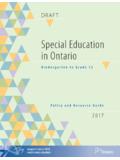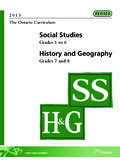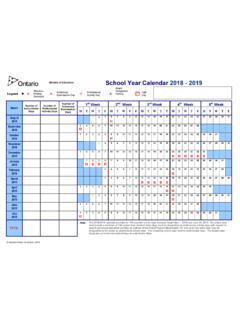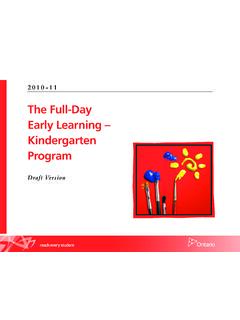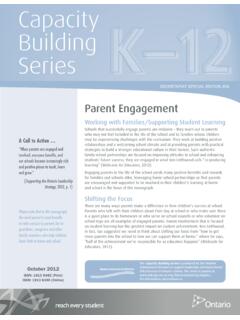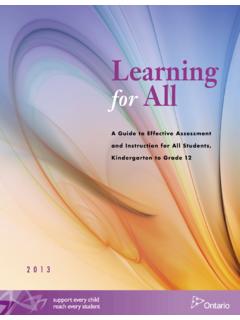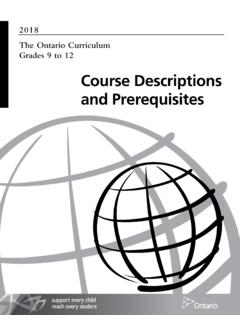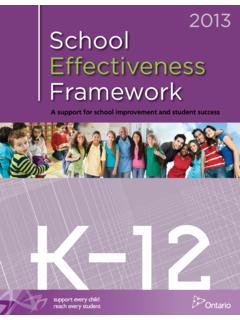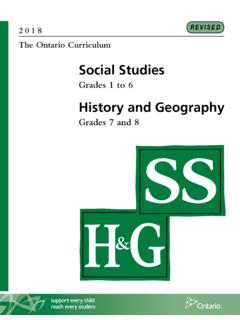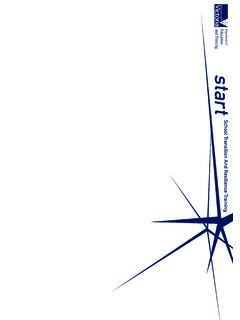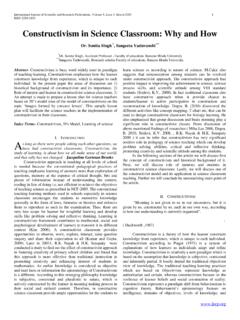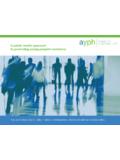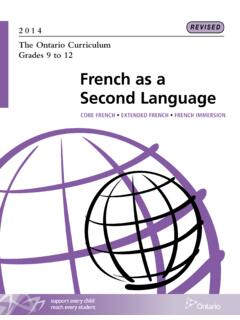Transcription of The Ontario Curriculum Grades 10 to 12 Computer Studies ...
1 2008 REVISED. The Ontario Curriculum Grades 10 to 12. Computer Studies CONTENTS. INTRODUCTION 3. Secondary Schools for the Twenty-first Century .. 3. The Importance of Computer Studies in the Curriculum .. 3. The Goals of the Computer Studies Program .. 4. Four Critical Areas of Learning in Computer Studies .. 4. Roles and Responsibilities in Computer Studies Programs .. 4. THE PROGRAM IN Computer Studies 7. Overview of the Program .. 7. Curriculum Expectations .. 9. Strands in the Computer Studies Curriculum .. 11. ASSESSMENT AND EVALUATION OF STUDENT ACHIEVEMENT 12.
2 Basic Considerations .. 12. The Achievement Chart for Computer Studies .. 13. Evaluation and Reporting of Student Achievement .. 18. Reporting on Demonstrated Learning Skills .. 18. SOME CONSIDERATIONS FOR PROGRAM PLANNING 19. Instructional Approaches .. 19. The Importance of Current Events in Computer Studies .. 20. The Role of ICT in Computer Studies .. 20. Planning Computer Studies Programs for Students With Special Education Needs .. 21. Program Considerations for English Language Learners .. 24. Antidiscrimination Education in Computer Studies .
3 26. Environmental Education and Computer Studies .. 27. Literacy, Mathematical Literacy, and Inquiry/Research Skills .. 28. The Ontario Skills Passport and Essential Skills .. 28. Career Education .. 29. Cooperative Education and Other Forms of Experiential Learning .. 29. Planning Program Pathways and Programs Leading to a Specialist High Skills Major .. 30. Health and Safety in Computer Studies .. 30. Une publication quivalente est disponible en fran ais sous le titre suivant : Le Curriculum de l' Ontario , de la 10e la 12e ann e : tudes informatiques.
4 This publication is available on the Ministry of Education's website, at COURSES 31. Introduction to Computer Studies , Grade 10, Open (ICS2O).. 33. Introduction to Computer Science, Grade 11, University Preparation (ICS3U) .. 39. Introduction to Computer Programming, Grade 11, College Preparation (ICS3C) .. 47. Computer Science, Grade 12, University Preparation (ICS4U).. 55. Computer Programming, Grade 12, College Preparation (ICS4C) .. 63. INTRODUCTION. This document replaces the Computer and Information Science component of The Ontario Curriculum , Grades 9 and 10: Technological Education, 1999, and of The Ontario Curriculum , Grades 11 and 12: Technological Education, 2000.
5 Beginning in September 2009, all Computer Studies courses for Grades 10 to 12 will be based on the expecta- tions outlined in this document. SECONDARY SCHOOLS FOR THE TWENTY-FIRST CENTURY. The goal of Ontario secondary schools is to support high-quality learning while giving individual students the opportunity to choose programs that suit their skills and inter- ests. The updated Ontario Curriculum , in combination with a broader range of learning options outside traditional classroom instruction, will enable students to better customize their high school education and improve their prospects for success in school and in life.
6 THE IMPORTANCE OF Computer Studies IN THE Curriculum . Computer Studies is about how computers compute. It is not about learning how to use the Computer , and it is much more than Computer programming. Computer Studies is the study of ways of representing objects and processes. It involves defining problems;. analysing problems; designing solutions; and developing, testing, and maintaining programs. For the purposes of this document, the term Computer Studies refers to the study of Computer science, meaning Computer and algorithmic processes, including their principles, their hardware and software designs, their applications, and their impact on society.
7 The major focus of these courses is the development of programming skills, which are important for success in future postsecondary Studies . Computer Studies is relevant for all students because it incorporates a broad range of transferable problem-solving skills and techniques, including logical thinking, creative design, synthesis, and evaluation. It also teaches generically useful skills in such areas as communication, time management, organization, and teamwork. Students live in a technologically rich world, and Computer Studies will provide them with the knowl- edge and skills to understand the underpinnings of current Computer technology and prepare them for emerging technologies.
8 A foundation in this discipline will introduce students to the excitement and opportunities afforded by this dynamic field and will begin to prepare them for a range of rewarding careers. The Computer Studies program will build a strong foundation for those who wish to move on to further study and training in specialized areas such as Computer programming, database analysis, Computer science, education, Computer engineering, software engineer- ing, information technology, and game development. 3. The Goals of the Computer Studies Program The fundamental purpose of the Computer Studies program is to provide students with knowledge, skills, and attitudes that will enable them to achieve success in secondary school, the workplace, postsecondary education or training, and daily life.
9 The goals of the Computer Studies Curriculum are to enable students to: gain an understanding of Computer Studies concepts;. develop the skills, including critical thinking skills, and the knowledge of strategies required to do research, conduct inquiries, and communicate findings accurately, ethically, and effectively;. apply the knowledge, skills, and attitudes acquired through the study of com- puters to a variety of learning tasks and relate them to Computer phenomena on the local, national, and global levels;. develop lifelong learning habits that will help them adapt to Computer advances in the changing workplace and world.
10 Make connections that will help them take advantage of potential postsecondary educational and work opportunities. FOUR CRITICAL AREAS OF LEARNING IN Computer Studies . Effective learning in all aspects of Computer Studies depends on the development of knowledge and skills in the following four areas: Software development (including project management and software engineering principles). Algorithms and data structures Program correctness and efficiency Professional and ethical responsibility The Computer Studies Curriculum in Grades 10 to 12 offers a range of courses, all of which are structured to give students a solid foundation in these four areas.
